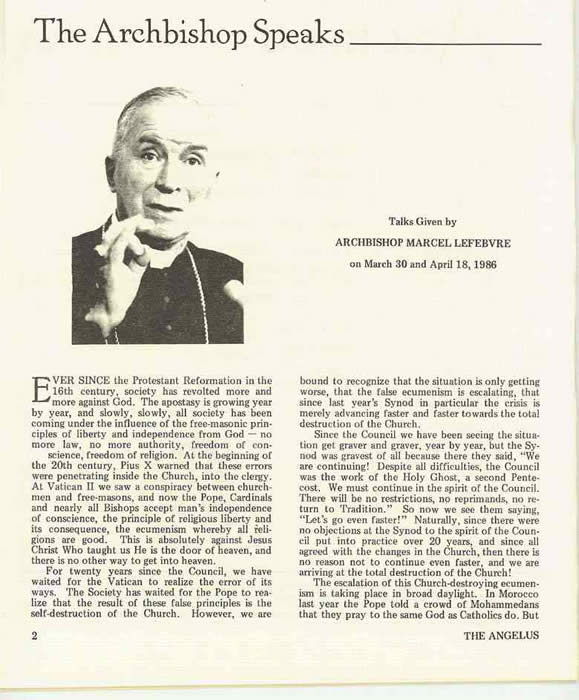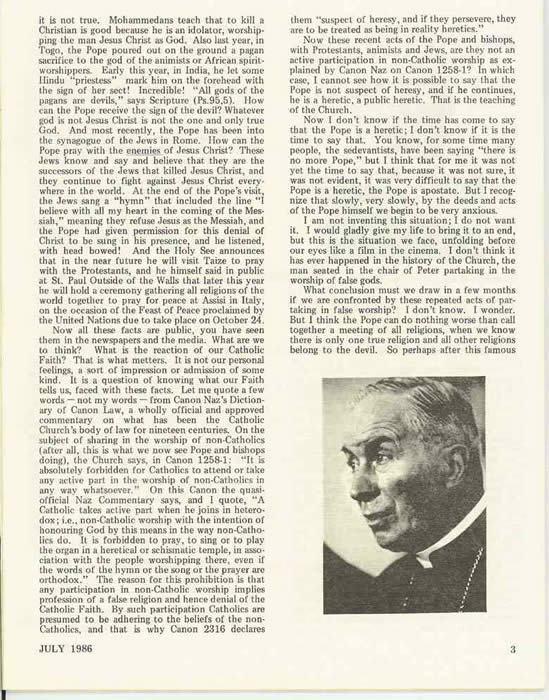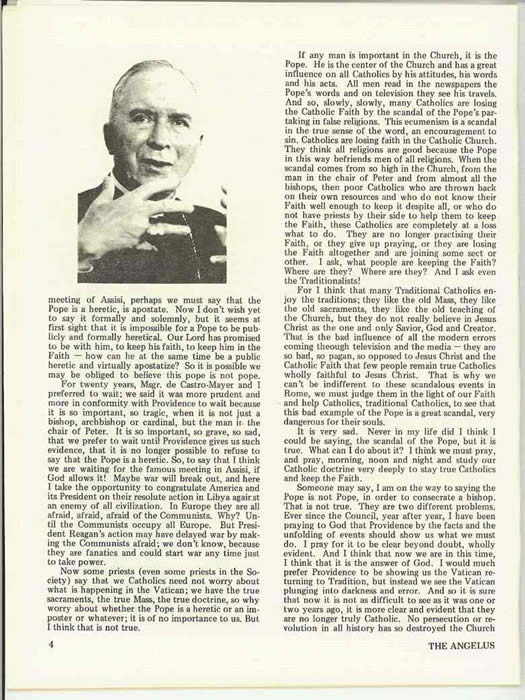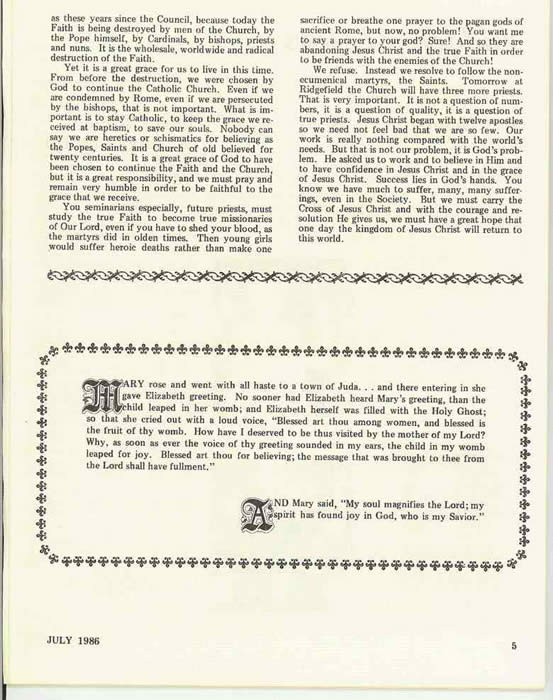"I did not invent this situation, I do not want it."
Those words belong to the late Archbishop Marcel Lefebvre, who used conferences in March and April of 1986 to raise questions about then Pope John Paul II's participation in the then forthcoming Assisi travesty. Combined with the forceful language used by Bishop Tissier de Mallerais' recent interview with Mr. Stephen Heiner, it is useful to revisit Archbishop Lefebvre's 1986 conferences to understand that the questions being raised today are nothing new. We must face reality as it is, as the late Archbishop noted in his conferences. How is it possible for a pope to do and say the things that the recent popes have done and said that are at odds with the entire patrimony of the Catholic Church?
As I have noted in several recent commentaries, one of the goals of the conciliarist revolutionaries is to break down the resistance to novelties and ambiguities that is part of our sensus Catholicus. We are to suspend all rationality in order to accept uncritically formulations of the Faith that can put doubt into the minds of Catholics and non-Catholics alike. How is a non-Catholic--or a poorly-formed Catholic--going to understand a theological pronouncement "well" when its formulation is not clear, when it is subject to a variety of contradictory interpretations. Pope Pius XII condemned such a nebulous approach as injurious to the Faith in Humani Generis, to which I return once again for the sake of emphasis:
In theology some want to reduce to a minimum the meaning of dogmas; and to free dogma itself from terminology long established in the Church and from philosophical concepts held by Catholic teachers, to bring about a return in the explanation of Catholic doctrine to the way of speaking used in Holy Scripture and by the Fathers of the Church. They cherish the hope that when dogma is stripped of the elements which they hold to be extrinsic to divine revelation, it will compare advantageously with the dogmatic opinions of those who are separated from the unity of the Church and that in this way they will gradually arrive at a mutual assimilation of Catholic dogma with the tenets of the dissidents.
Moreover they assert that when Catholic doctrine has been reduced to this condition, a way will be found to satisfy modern needs, that will permit of dogma being expressed also by the concepts of modern philosophy, whether of immanentism or idealism or existentialism or any other system. Some more audacious affirm that this can and must be done, because they hold that the mysteries of faith are never expressed by truly adequate concepts but only by approximate and ever changeable notions, in which the truth is to some extent expressed, but is necessarily distorted. Wherefore they do not consider it absurd, but altogether necessary, that theology should substitute new concepts in place of the old ones in keeping with the various philosophies which in the course of time it uses as its instruments, so that it should give human expression to divine truths in various ways which are even somewhat opposed, but still equivalent, as they say. They add that the history of dogmas consists in the reporting of the various forms in which revealed truth has been clothed, forms that have succeeded one another in accordance with the different teachings and opinions that have arisen over the course of the centuries.
It is evident from what We have already said, that such tentatives not only lead to what they call dogmatic relativism, but that they actually contain it. The contempt of doctrine commonly taught and of the terms in which it is expressed strongly favor it. Everyone is aware that the terminology employed in the schools and even that used by the Teaching Authority of the Church itself is capable of being perfected and polished; and we know also that the Church itself has not always used the same terms in the same way. It is also manifest that the Church cannot be bound to every system of philosophy that has existed for a short space of time. Nevertheless, the things that have been composed through common effort by Catholic teachers over the course of the centuries to bring about some understanding of dogma are certainly not based on any such weak foundation. These things are based on principles and notions deduced from a true knowledge of created things. In the process of deducing, this knowledge, like a star, gave enlightenment to the human mind through the Church. Hence it is not astonishing that some of these notions have not only been used by the Oecumenical Councils, but even sanctioned by them, so that it is wrong to depart from them.
Hence to neglect, or to reject, or to devalue so many and such great resources which have been conceived, expressed and perfected so often by the age-old work of men endowed with no common talent and holiness, working under the vigilant supervision of the holy magisterium and with the light and leadership of the Holy Ghost in order to state the truths of the faith ever more accurately, to do this so that these things may be replaced by conjectural notions and by some formless and unstable tenets of a new philosophy, tenets which, like the flowers of the field, are in existence today and die tomorrow; this is supreme imprudence and something that would make dogma itself a reed shaken by the wind. The contempt for terms and notions habitually used by scholastic theologians leads of itself to the weakening of what they call speculative theology, a discipline which these men consider devoid of true certitude because it is based on theological reasoning.
Unfortunately these advocates of novelty easily pass from despising scholastic theology to the neglect of and even contempt for the Teaching Authority of the Church itself, which gives such authoritative approval to scholastic theology. This Teaching Authority is represented by them as a hindrance to progress and an obstacle in the way of science. Some non Catholics consider it as an unjust restraint preventing some more qualified theologians from reforming their subject. And although this sacred Office of Teacher in matters of faith and morals must be the proximate and universal criterion of truth for all theologians, since to it has been entrusted by Christ Our Lord the whole deposit of faith -- Sacred Scripture and divine Tradition -- to be preserved, guarded and interpreted, still the duty that is incumbent on the faithful to flee also those errors which more or less approach heresy, and accordingly "to keep also the constitutions and decrees by which such evil opinions are proscribed and forbidden by the Holy See," is sometimes as little known as if it did not exist. What is expounded in the Encyclical Letters of the Roman Pontiffs concerning the nature and constitution of the Church, is deliberately and habitually neglected by some with the idea of giving force to a certain vague notion which they profess to have found in the ancient Fathers, especially the Greeks. The Popes, they assert, do not wish to pass judgment on what is a matter of dispute among theologians, so recourse must be had to the early sources, and the recent constitutions and decrees of the Teaching Church must be explained from the writings of the ancients.
This describes the entire theological approach of the "New Thinkers," including the former Joseph Cardinal Ratzinger, very accurately. The good of souls is jeopardized by this "new theology." Questions are therefore raised not by those who point out these problems but by the adherents of the "New Theology," including Pope Benedict XVI himself. Bishop Tissier de Mallerais, a man who is not prone to rash judgments, said that Father Joseph Ratzinger's An Introduction to Christianity was "full of heresies." Loose language? Some say so. Others look at the facts and see the pattern into which the writings of the former Prefect of the Congregation for the Doctrine of Faith fit.
The Angelus contained the following transcription of two conferences given by Archbishop Lefebvre in 1986. He used the same strong language as Bishop Tissier de Mallerais. He raised quite directly some of the questions that are being raised in various places today. Was he putting his own soul above those of the Catholics he was addressing? Or was the late Archbishop attempting to get Catholics to think about the gravity of the situation facing the Church in her human elements so that they would pray harder and be more on their guard to understand the dangers emanating from what the Archbishop called on various occasions "Modernist Rome."
Here is the transcription of the Archbishop's 1986 remarks, which are reproduced in photographic form:




To raise questions about our ecclesiastical situation is not to lead anyone into despair. It is, though, to point out that there is no clear, ready answer available to anyone except an authentic mystic. This is why we must respect our fellow traditional Catholics no matter what stands they have taken concerning our difficulties. None of us invented this situation. None us wants this situation. It is what it is. Travesties such as World Youth Day and the abominable sacrileges of false worship offered to false gods by Catholic prelates are the norm. Ignorance of the Catholic Faith and hatred of her past characterize the attitudes of most of the world's bishops and priests, especially those trained in the past forty years. Only a miracle will save us right now, which is why we must cleave as never before to Our Lady and her Most Chaste Spouse, the Patron of the Universal Church and the Protector of the Faithful, so as to maintain our resolve in these trying times.
Yes, I have raised questions. Very good priests are responding with a variety of answers. Some are responding to Cum Ex Apostolatus Officio. Others are responding to the matter of the episcopal consecrations. I am seeker of truth. That is all. I will give air to the responses I have been receiving. No good is done for souls by pretending these issues do not exist and are not important to discuss. The different sides involved in the Great Schism produced very strong tracts to enunciate their positions. Nothing but good can come for Holy Mother Church when those who recognize the extent of the apostasy that we face can address matters of pressing concern. I will take the words of Archbishop Lefebvre for my own, "I am not inventing this situation; I do not want it." Do you think that this any way to make a living and support a family? As we say in New York, puuuuuhhhhhhhllllllllllllllllllllllleeeeeeeeeeeeeeease!
God has known from all eternity that we would be living in these times. The graces He won for us on Calvary by the shedding of every single drop of His Most Precious Blood are sufficient for us to deal with our difficulties, which He wants us to give to Him through Our Lady's Sorrowful and Immaculate Heart. We can, though, listen to those with whom we disagree about the nature and extent of the problems in the Church in her human elements and come to a recognition that such people may in the long run be proven correct. Above all else, though, we must concentrate on the sanctification and salvation of our souls as we keep close to Our Lady and Saint Joseph, as we enthrone our homes to the Most Sacred Heart of their Divine Son, as we cleave to the fullness of Tradition without compromise no matter the cost in human terms that we are asked to pay. For none of us has anything to gain (human respect, financial benefit, employment) by asking the questions in 2006 that Archbishop Lefebvre himself raised in 1986.
Our Lady of Fatima, pray for us.
Saint Joseph, pray for us.
Saint John the Baptist, pray for us.
Saint John the Beloved, pray for us.
Saint Stanislaus, pray for us.
Saint Michael the Archangel, pray for us.
Saint Gabriel the Archangel, pray for us.
Saint Raphael the Archangel, pray for us.
Saints Peter and Paul, pray for us.
Saint Helena, pray for us.
Saint Monica, pray for us.
Pope Saint Pius V, pray for us on this day, your feast day!
Pope Saint Pius X, pray for us.
Saint Catherine Laboure, pray for us.
Saint Margaret Mary Alacoque, pray for us.
Saint Basil the Great, pray for us.
Saint Gertrude the Great, pray for us.
Pope Saint Gregory the Great, pray for us.
Saint Bridget of Sweden, pray for us.
Saint Nicholas of Myra, pray for us.
Saint Nicholas of Flue, pray for us.
Saint Augustine, pray for us.
Saint Thomas Aquinas, pray for us.
Saint Peter Canisius, pray for us.
Saint Isaac Jogues and Companions, pray for us.
Saint Edmund Campion, pray for us.
Saint Athanasius, pray for us.
Saint Philomena, pray for us.
Blessed Pauline Jaricot, pray for us.
Blessed Francisco, pray for us.
Blessed Jacinta, pray for us.
Sister Lucia, pray for us.
Ignatius Cardinal Kung, pray for the beleaguered Church in Red China.
An Afterword: Archbishop Marcel Lefebvre Reflecting on his "Suspension," 1976:
“What could be clearer. We are suspended a divinis by the conciliar church, for the conciliar church to which we have no wish to belong.
The conciliar church is a schismatic church because it breaks with the Catholic Church that has always been. It has its new dogmas, its new priesthood, its new institutions, its new worship; all already condemned by the church in many a document – official and definitive.
This is why the founders of the conciliar church insist so much on obedience to today’s church, prescinding from yesterday’s church as though it no longer existed.
This conciliar church is schismatic because it has taken as a basis for its updating, principals opposed to those of the Catholic Church. This conciliar church is therefore not Catholic!
To whatever extent pope, bishops, priests, or faithful adhere to this new church, they separate themselves from the Catholic Church.
Today’s Church is the true Church only to whatever extent it is a continuation of and one body with the Church of yesterday and of always. The norm of Catholic faith is tradition. The demand of His Eminence Msgr Benelli is then illuminating: submission to the conciliar church, to the Vatican II church, to the schismatic church!
For our part we persevere in the Catholic church by the grace of the Lord Jesus Christ and the intercession of the Blessed Virgin Mary."
Whatever our conclusions currently, can we all agree that Archbishop Lefebvre was exactly correct thirty years ago?
A Few Reflections to Keep in Mind as We Keep in Prayer
The Church will be punished because the majority of her members, high and low, will become so perverted. The Church will sink deeper and deeper until she will at last seem to be extinguished, and the succession of Peter and the other Apostles to have expired. But, after this, she will be victoriously exalted in the sight of all doubters. (Saint Nicholas of Flue)
Blessed Anne Katherine Emmerich had a pretty good grasp on what would happen in the future, which appears to describe perfectly our own present days:
Then, I saw that everything that pertained to Protestantism was gradually gaining the upper hand, and the Catholic religion fell into complete decadence. Most priests were lured by the glittering but false knowledge of young school-teachers, and they all contributed to the work of destruction.
In those days, Faith will fall very low, and it will be preserved in some places only, in a few cottages and in a few families which God has protected from disasters and wars.
I see many excommunicated ecclesiastics who do not seem to be concerned about it, or even aware of it. Yet, they are (ipso facto) excommunicated whenever they cooperate to [sic] enterprises, enter into associations, and embrace opinions on which an anathema has been cast. It can be seen thereby that God ratifies the decrees, orders and interdictions issued by the Head of the Church, and that He keeps them in force even though men show no concern for them, reject them, or laugh them to scorn. . . .
I saw that many pastors allowed themselves to be taken up with ideas that were dangerous to the Church. They were building a great, strange, and extravagant Church. Everyone was to be admitted in it in order to be united and have equal rights: Evangelicals, Catholics, sects of every description. Such was to be the new Church. . . But God had other designs.
The Longer Version of the Saint Michael the Archangel Prayer, composed by Pope Leo XIII, 1888
O glorious Archangel Saint Michael, Prince of the heavenly host, be our defense in the terrible warfare which we carry on against principalities and powers, against the rulers of this world of darkness, spirits of evil. Come to the aid of man, whom God created immortal, made in His own image and likeness, and redeemed at a great price from the tyranny of the devil. Fight this day the battle of our Lord, together with the holy angels, as already thou hast fought the leader of the proud angels, Lucifer, and his apostate host, who were powerless to resist thee, nor was there place for them any longer in heaven. That cruel, that ancient serpent, who is called the devil or Satan who seduces the whole world, was cast into the abyss with his angels. Behold this primeval enemy and slayer of men has taken courage. Transformed into an angel of light, he wanders about with all the multitude of wicked spirits, invading the earth in order to blot out the Name of God and of His Christ, to seize upon, slay, and cast into eternal perdition, souls destined for the crown of eternal glory. That wicked dragon pours out. as a most impure flood, the venom of his malice on men of depraved mind and corrupt heart, the spirit of lying, of impiety, of blasphemy, and the pestilent breath of impurity, and of every vice and iniquity. These most crafty enemies have filled and inebriated with gall and bitterness the Church, the spouse of the Immaculate Lamb, and have laid impious hands on Her most sacred possessions. In the Holy Place itself, where has been set up the See of the most holy Peter and the Chair of Truth for the light of the world, they have raised the throne of their abominable impiety with the iniquitous design that when the Pastor has been struck the sheep may be scattered. Arise then, O invincible Prince, bring help against the attacks of the lost spirits to the people of God, and give them the victory. They venerate thee as their protector and patron; in thee holy Church glories as her defense against the malicious powers of hell; to thee has God entrusted the souls of men to be established in heavenly beatitude. Oh, pray to the God of peace that He may put Satan under our feet, so far conquered that he may no longer be able to hold men in captivity and harm the Church. Offer our prayers in the sight of the Most High, so that they may quickly conciliate the mercies of the Lord; and beating down the dragon, the ancient serpent, who is the devil and Satan, do thou again make him captive in the abyss, that he may no longer seduce the nations. Amen.
Verse: Behold the Cross of the Lord; be scattered ye hostile powers.
Response: The Lion of the Tribe of Juda has conquered the root of David.
Verse: Let Thy mercies be upon us, O Lord.
Response: As we have hoped in Thee.
Verse: O Lord hear my prayer.
Response: And let my cry come unto Thee.
Verse: Let us pray. O God, the Father of our Lord Jesus Christ, we call upon Thy holy Name, and as suppliants, we implore Thy clemency, that by the intercession of Mary, ever Virgin, immaculate and our Mother, and of the glorious Archangel Saint Michael, Thou wouldst deign to help us against Satan and all other unclean spirits, who wander about the world for the injury of the human race and the ruin of our souls.
Response: Amen.
![]()



